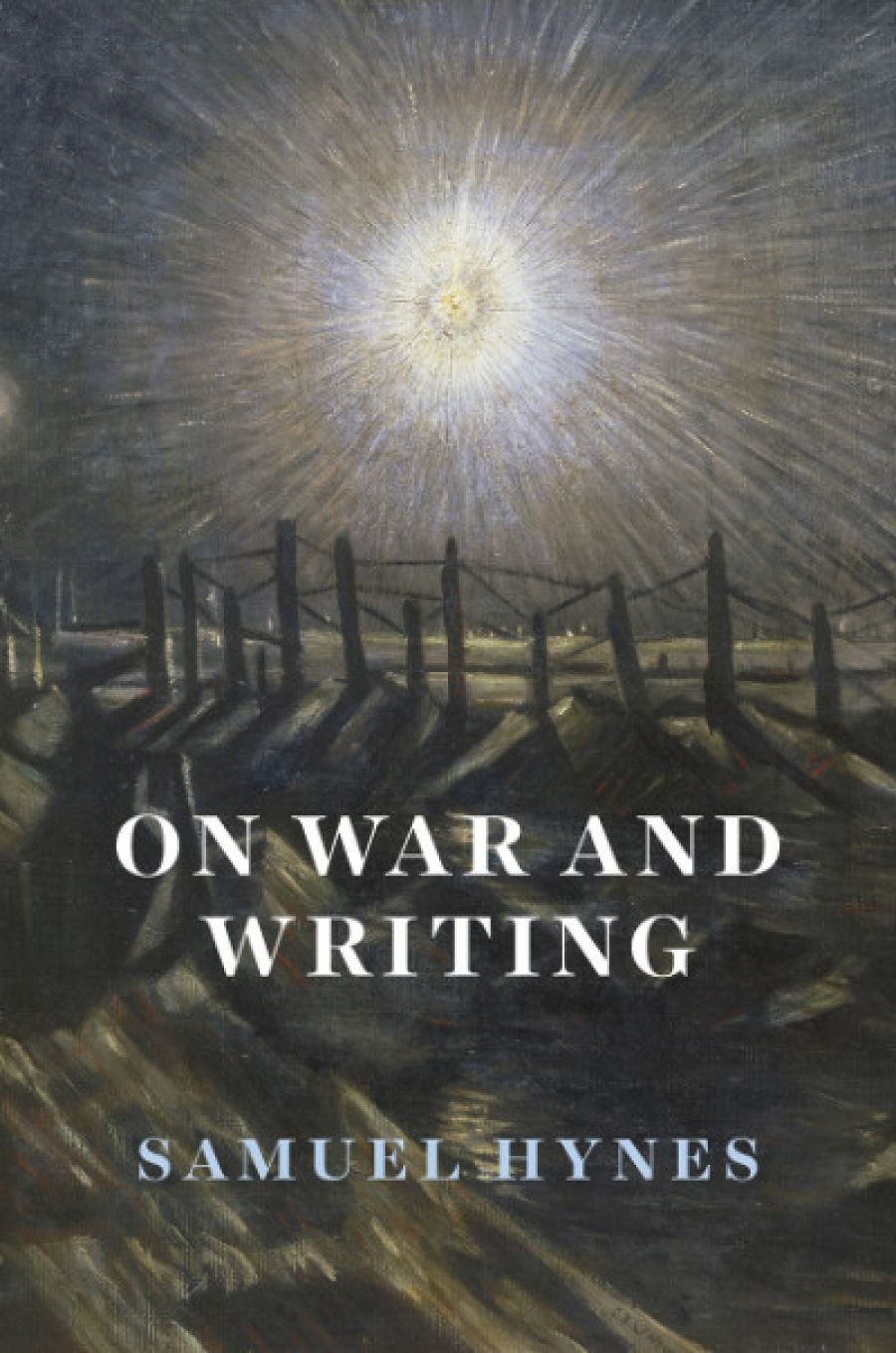
- Free Article: No
- Contents Category: Essay Collection
- Custom Article Title: Robin Gerster reviews 'On War and Writing' by Samuel Hynes
- Custom Highlight Text:
'Every man thinks meanly of himself for not having been a soldier.’ Samuel Johnson’s aphorism was commended to me many years ago by Peter Ryan, then the long-serving publisher at Melbourne University Press. The author of a superb personal account of his war experience ...
- Book 1 Title: On War and Writing
- Book 1 Biblio: University of Chicago Press (Footprint), $44.99 hb, 215 pp, 9780226468785
It is logical to assume that it helps to have experienced war in order to write about it, though the preponderance of mediocre ‘war memoirs’ might suggest otherwise. ‘We can never entirely imagine what it’s like to actually fight a war,’ Samuel Hynes suggests in On War and Writing, a new selection of his essays exploring the traditions of war writing from the beginning of the twentieth century to the present. ‘The closest we can come is reading the records of men who were there, ordinary young guys, most of them.’ Hynes, the Woodrow Wilson Emeritus Professor of Literature at Princeton, now in his nineties, has the personal credentials to make this claim: he is an established critic of war literature who, as a young man serving as a pilot in the Marine Corps in the Pacific theatre in World War II, received the Distinguished Flying Cross.
War experience alone does not guarantee writing well about battle. As Hynes suggests, some of the best war books have been written by those with no direct knowledge of combat. It does help to have an imagination and the literary wherewithal to express it. One of the most compelling chapters in On War and Writing is a critical appreciation of a work by Thomas Hardy, who never heard a bullet fired in anger. Hardy’s monstrous poetic drama about the Napoleonic Wars, The Dynasts (1908), is in Hynes’s opinion ‘the nearest English poetry has come to a war epic’. It is also ‘the last one we shall ever have, because it was written in the last decade in English history in which a war epic was possible’.
Hynes is alluding to the cataclysmic effect of World War I on the way war is represented and remembered. As Hynes suggested in The Auden Generation (1976), World War I deserves to be known as the ‘Great War’ because of its seismic impact on the social, political, and indeed literal landscape of Europe. But it was also a great literary event. The advent of the machine gun, mustard gas, and especially long-range heavy artillery mocked any pretensions to prowess. The conventions of heroic war storytelling dating back to Homer were now useless; an Achilles was as impotent before the impersonal force of a high-explosive shell as the most inept weakling. The scale and intensity of the fighting along the Western Front compelled writers, Hynes pungently observed, ‘to find new ways for describing the ways in which men kill men’.
In On War and Writing, Hynes returns to this theme, particularly in the key essay ‘A Critic Looks at War’. After the mechanised slaughter on the Western Front, war stories would have to be told ‘without Big Words’. Hynes quotes Ernest Hemingway in A Farewell to Arms (1929): ‘Abstract words such as glory, honor, courage or hallow were obscene beside the concrete names of villages, the numbers of roads, the names of rivers, the numbers of regiments and the dates.’ In his own scholarly discourse about war, Hynes recommends avoiding ‘windy words’. War history, he says, should not be turned into ‘a Veterans Day parade’. (This is advice that should be heeded in Australia.) One of Hynes’s most dispiriting insights is that, in the end, the good efforts of poets like Wilfred Owen to discredit the romance of war and the inanity of patriotic self-sacrifice have come to nothing. In popular culture and the political rhetoric that both feeds and draws sustenance from it, the ‘old Lie’, as Owen dubbed it, lives on.
 Samuel Hynes (photo via Princeton University)
Samuel Hynes (photo via Princeton University)
Hynes recognises war as ‘a primal human activity’, but shies away from investigating the political and psychological reasons why. Finally, in the last essay in the collection, Hynes gives personal voice to a sense of the surfeit of war that burdens human history. It comes at the end of an account of his long-distance flight from south-east England across the Channel, then east over northern France to Verdun and back. It was around 1990, early in his retirement, and Hynes was combining his love of flying with his scholarly interest in war. He flew over the old Western Front, a landscape now marked by a multitude of monuments and by the tourist multitudes doing the World War I trail. The flying itself was an ‘intense and special pleasure’. But Hynes’s feelings at the journey’s end are ‘tangled and contradictory’. ‘I have spent two days looking down at the story of war that is written on the French earth,’ he writes, ‘and I feel heavy with the sadness of cemeteries.’ It is a touching if typically unhistrionic note on which to end this fine reconsideration of war and its literary remembrance.


Comments powered by CComment